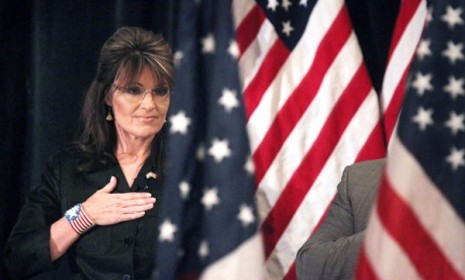The Tea Party's risky foreign-policy dilemma
The populist protesters walk in lockstep on small government demands, but seem lost on what to do overseas. Will that limit the Tea Party's power?

The Tea Party movement has been "the most controversial and dramatic development in American politics in many years," says Walter Russell Mead at Foreign Affairs, uniting conservatives and independents behind the cause of reducing the role of government in American life. But Tea Partiers are divided on foreign policy, Mead says, with some embracing the isolationism of Rep. Ron Paul (R-Texas), and others backing Sarah Palin's belief that the U.S. should fight the war on terror globally. Can the Tea Party become a lasting force in politics without a clear position on foreign policy?
With no international vision, the Tea Party will fade: The Tea Party's problem is not that it is divided between its "Palinite" and "Paulite" wings, says Daniel W. Drezner at Foreign Policy. The real issue is that Tea Partiers "don't care about foreign policy." That leaves a big hole in the Tea Party's potential influence. In 10 years we'll remember it like Ross Perot's Reform Party — as "a brief, interesting but in the end unstable collection of political oddities."
The Week
Escape your echo chamber. Get the facts behind the news, plus analysis from multiple perspectives.

Sign up for The Week's Free Newsletters
From our morning news briefing to a weekly Good News Newsletter, get the best of The Week delivered directly to your inbox.
From our morning news briefing to a weekly Good News Newsletter, get the best of The Week delivered directly to your inbox.
Foreign policy will not kill the Tea Party: Okay, so "foreign policy isn't what truly animates the Tea Party," says Andrew Sullivan at The Atlantic, but that doesn't mean the movement is "on its way out." As fiscal conservatives, Tea Partiers probably wouldn't mind wrapping things up in Afghanistan, avoiding intervention in Libya, reducing defense spending, and pulling the plug on nation building. They're not as divided on foreign policy as you might think.
Even with the split, Tea Party populism has an impact: Yes, the Tea Party is divided on foreign policy, says Donald Douglas at American Power, but so is the broader conservative movement. The Palinites appear to have the edge in this era of deep U.S. involvement abroad. But "regardless of how the immediate Tea Party splits play out in the short run," the populism that has fueled the Tea Party's rise will have a "lasting impact" on America's relations with the rest of the world.
"Tea Party populism and America's international relations"
A free daily email with the biggest news stories of the day – and the best features from TheWeek.com
-
 Le Pen back in the dock: the trial that’s shaking France
Le Pen back in the dock: the trial that’s shaking FranceIn the Spotlight Appealing her four-year conviction for embezzlement, the Rassemblement National leader faces an uncertain political future, whatever the result
-
 The doctors’ strikes
The doctors’ strikesThe Explainer Resident doctors working for NHS England are currently voting on whether to go out on strike again this year
-
 5 chilling cartoons about increasing ICE aggression
5 chilling cartoons about increasing ICE aggressionCartoons Artists take on respect for the law, the Fourth Amendment, and more
-
 The billionaires’ wealth tax: a catastrophe for California?
The billionaires’ wealth tax: a catastrophe for California?Talking Point Peter Thiel and Larry Page preparing to change state residency
-
 Bari Weiss’ ‘60 Minutes’ scandal is about more than one report
Bari Weiss’ ‘60 Minutes’ scandal is about more than one reportIN THE SPOTLIGHT By blocking an approved segment on a controversial prison holding US deportees in El Salvador, the editor-in-chief of CBS News has become the main story
-
 Has Zohran Mamdani shown the Democrats how to win again?
Has Zohran Mamdani shown the Democrats how to win again?Today’s Big Question New York City mayoral election touted as victory for left-wing populists but moderate centrist wins elsewhere present more complex path for Democratic Party
-
 Millions turn out for anti-Trump ‘No Kings’ rallies
Millions turn out for anti-Trump ‘No Kings’ ralliesSpeed Read An estimated 7 million people participated, 2 million more than at the first ‘No Kings’ protest in June
-
 Ghislaine Maxwell: angling for a Trump pardon
Ghislaine Maxwell: angling for a Trump pardonTalking Point Convicted sex trafficker's testimony could shed new light on president's links to Jeffrey Epstein
-
 The last words and final moments of 40 presidents
The last words and final moments of 40 presidentsThe Explainer Some are eloquent quotes worthy of the holders of the highest office in the nation, and others... aren't
-
 The JFK files: the truth at last?
The JFK files: the truth at last?In The Spotlight More than 64,000 previously classified documents relating the 1963 assassination of John F. Kennedy have been released by the Trump administration
-
 'Seriously, not literally': how should the world take Donald Trump?
'Seriously, not literally': how should the world take Donald Trump?Today's big question White House rhetoric and reality look likely to become increasingly blurred